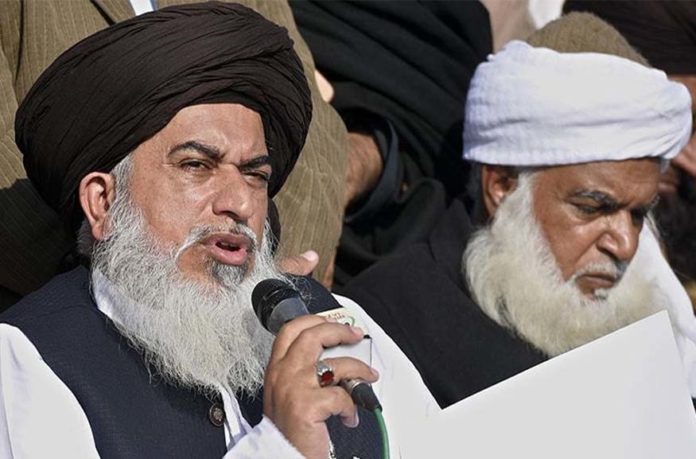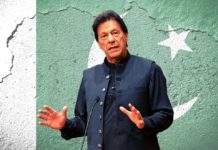Disclaimer: The Eqbal Ahmad Centre for Public Education (EACPE) encourages critical and independent thinking and believes in a free expression of one’s opinion. However, the views expressed in contributed articles are solely those of their respective authors and do not necessarily reflect the position or policy of the EACPE.
Followed by no more than two thousand people, Molana Khadim Hussain Rizvi disconnected federal capital and surrounding areas from the rest of the country, a year ago. On its anniversary, geared with much confidence and a lot more support, he was successfully able to gather a huge crowd by inciting gullible people from various locations of country.
Rizvi and company berated the venerable judges of the Supreme Court, as well as didn’t spare the Army Chief, and hence, gained ephemeral popularity. His blind followers equally crossed the limit beyond the right of protest. The government authorities, despite a hard hitting and courageous address to the nation by Prime Minister, failed to maintain law and order while angry mob kept roaming freely on the roads and streets challenging the writ of the state. . In the meanwhile, there occurred the brutal killing of renowned religious scholar Maulana Sami-ul-Haq, renowned for his significance with reference to Afghan Taliban and negotiations with them.. As usual, the government has started investigation of his assassination, but one wonders about the slayer of Benazir Bhutto and finding of investigation of BB’s murder case.
If we reflect back to July 2007, the federal capital became the battle field during the last year of regime of General Pervez Musharraf, when government had to act on Lal Masjid and affiliated Jamia Hafsa students to maintain the state’s writ, something that not only hurt the image of the country but also politically damaged the already cornered military ruler due to ongoing Lawyers’ Movement. Lal Masjid fiasco further polarized the society and widened the divide between rightists and leftists in the country.
The government must ensure rule of law and there should be zero tolerance for those who make mockery of justice and challenge the writ of the state.
Amidst all chaos that followed the Tehreek-e-Labbaik’s protest after the Asia Bibi case verdict, the Prime Minister made a bold speech addressing the strikers and warned them to mend their ways, as no compromise on the writ of the state will be made. Despite his clear message, protesters kept on doing what they were doing and government couldn’t implement its writ. After the agreement was signed between government and Tehreek-e-Labbaik Pakistan (TLP), dharna was ended. It was more a display of weakness of the state than maintenance of its writ. Afterward, the government has been seeking to arrest those miscreants who were involved in damaging and looting public and private property, obstructing the roads, and challenging the state. Moreover, it is requested to the masses to help in pointing out such miscreants so that they are brought to justice.
Pakistani constitution does assure freedom of movement, freedom of assembly and freedom of association and considers them as one of fundamental rights of the citizens. However, what we had observed vis-à-vis protests by TLP couldn’t be equated with fundamental rights, and rightly so, Khadim Hussain Rizvi and Afzal Qadri have been charged with treason and terrorism.
Prime Mimister, while addressing the nation referred the protesters as “chota tabqa” (a small segment), but it is quite evident how much this so called chota tabqa is influential. For instance: The Army Chief, Gen. Qamar Javed Bajva, had to conduct Mehfil-e-Meelaad, as well as had to offer an Umrah after he was promoted as army chief, apparently in a bid to shun accusations on his religious credentials and to present himself as a devoted Muslim. Just recently, he invited renowned religious figures in Nikkah ceremony of his son, including those who are well known for supporting the demands of TLP.
In another news, Pakistan’s ranking has gone worst in “2018 Global Right Index” showing where does the country stand when it comes to guarantee rights to citizens. Since the independence and despite some progress in various walks of life, unfortunately Pakistan seems like struggling to avoid the label of being a failed state. To avoid such misfortune, the government must ensure rule of law and there should one zero tolerance for those who make mockery of state and justice, including those who misuse the name of religion for their vested interests. What do you think?
 The writer, Irfan Khan, is a Researcher of Natural Sciences at Physics Department, Quaid-e-Azam University, Islamabad, Pakistan. He can be reached at ik8828903@gmail.com
The writer, Irfan Khan, is a Researcher of Natural Sciences at Physics Department, Quaid-e-Azam University, Islamabad, Pakistan. He can be reached at ik8828903@gmail.com



 The writer, Irfan Khan, is a Researcher of Natural Sciences at Physics Department, Quaid-e-Azam University, Islamabad, Pakistan. He can be reached at
The writer, Irfan Khan, is a Researcher of Natural Sciences at Physics Department, Quaid-e-Azam University, Islamabad, Pakistan. He can be reached at 




Nice article. Zero tolerance for terrorism and religious abuse